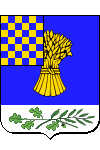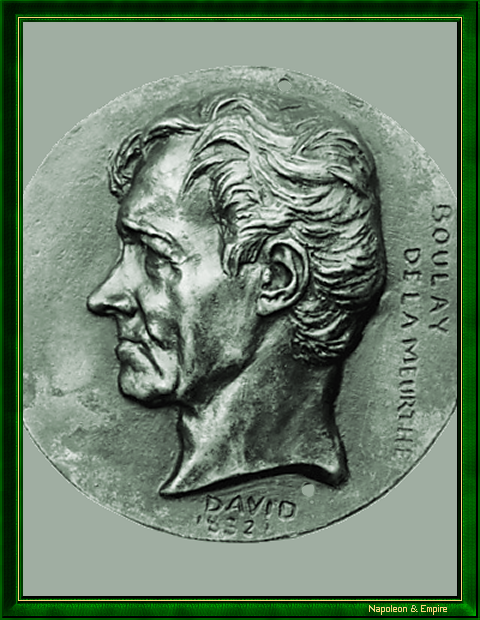Antoine Boulay, a.k.a. Boulay de la Meurthe
Count of the Empire, Grand Officer of the Legion of Honor
Pronunciation:

Antoine Jacques Claude Joseph Boulay was born on February 19, 1761 in Chaumonsey, Vosges, to farming parents. Orphaned in infancy, he was raised by an uncle, a parish priest near Nancy, and studied at the Collège de Toul.
Accepted as a lawyer in Nancy in 1783, then in Paris in 1786, he left the bar to join a battalion of Meurthe volunteers. He took part in the Argonne campaign in 1792, fighting at Valmy.
Ill, he returned to Nancy in 1793, where he was elected district court judge, before re-enlisting after being dismissed by a representative on a mission. Boulay fought in the Army of the Rhine and rose to the rank of captain.
He returned to Nancy, but was denounced as a suspect and had to hide in his native Chaumousey until the 9th of Thermidor. He was then elected president of the Nancy court, and appointed public prosecutor to the Meurthe criminal court.
On March 16, 1794, still in Nancy, he married Catherine Thiboust, who bore him five children: Antoine, Georges, Joseph, Charlotte and Henriette.
In 1797, the electorate of Meurthe appointed him deputy to the Conseil des Cinq-Cents. It was at this point that he added the name of his elected department to distinguish himself from his namesake.
Two years later, he took an active part in the coup d'état of 18 Brumaire and became rapporteur for the commission drafting the constitution of An VIII. Appointed State Councillor in 1800, he played a major role in drafting the Civil Code.
Although he voted against the establishment of the Empire, he was created a count in 1808, became section president of the Conseil d'Etat in 1810, and joined the Conseil de Régence in 1814.
Deposed by the Restoration, he was elected by La Meurthe as a member of the Chamber of Representatives in May 1815 after Napoleon's return. Appointed by the Emperor as Minister of State, he became, after the latter's abdication, a very short-lived Minister of Justice (June 23 - July 7, 1815) in the provisional government commission.
The resurrected monarchy stripped him of all his functions, and his name was added to the proscription order of July 24, 1815. His exile (in Germany) lasted until 1819. After his return to Paris, he took no further part in political life.
Boulay de la Meurthe died in Paris on February 4, 1840. He was buried in the Montparnasse cemetery , where his tombstone was engraved with Napoleon's verdict on him: Boulay was a brave and honest man
.
Franc-maçonnerie: In 1804, Merlin de Douai was Grand Officer of Honor of the Grand Orient of France.
"Antoine Jacques Claude Joseph Boulay de La Meurthe". Détail d'un médaillon en bronze réalisé en 1832 par Pierre-Jean David d'Angers (1788-1856).

Boulay's Memoirs have never been published.